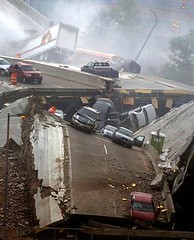The infrastructure crisis: fix it first, fund it, and be strategic

Posted March 25, 2008 at 10:06PM
 The nationally syndicated writer Neal Peirce has a great column out this week on the nation’s infrastructure woes. It basically confirms what we all have thought as we drive over ridiculously broken roads, try to crowd into too-few buses or subway cars, or read horrifying stories about a bridge collapsing, not to mention the tragic levee failures in Louisiana.
The nationally syndicated writer Neal Peirce has a great column out this week on the nation’s infrastructure woes. It basically confirms what we all have thought as we drive over ridiculously broken roads, try to crowd into too-few buses or subway cars, or read horrifying stories about a bridge collapsing, not to mention the tragic levee failures in Louisiana.
Peirce quotes Pennsylvania governor Rendell as reporting that “in 1960, 11.2 percent of federal non-defense spending went for infrastructure; today it's 3.5 percent. In 1987, America spent 1.17 percent of its gross domestic product on infrastructure; most recently it's .057 percent.”
This has led Rendell, California governor Schwarzenegger, and New York City’s mayor Bloomberg to join in a new “Building America’s Future” campaign to address the issues. Meanwhile, Sens. Chris Dodd (D-Conn.) and Chuck Hagel (R-Neb.) have proposed a National Infrastructure Bank to replace the ups and downs of year-by-year funding with long-term, self-financing bonds for major projects proposed by state or local governments. Preference would go for "fix-it-first" projects and require that they provide broad economic benefits, respond to the new challenges posed by climate change, and include a focus on the growing importance of urban areas.
 Even better, the America 2050 coalition (in which NRDC has been participating) has been advocating a bold new national vision for infrastructure that would comprise, among other things, dramatically improved intercity and commuter rail, rapid broadband expansion, and conscious protection for natural landscapes, estuaries and other “green infrastructure” that supports clean water and reduces carbon emissions. America 2050 is being led by the Regional Plan Association, which also has been championing the megaregion concept I addressed in an earlier post. House speaker Nancy Pelosi (D-Cal.) and Rep. Earl Blumenauer (D-Ore.) are on board.
Even better, the America 2050 coalition (in which NRDC has been participating) has been advocating a bold new national vision for infrastructure that would comprise, among other things, dramatically improved intercity and commuter rail, rapid broadband expansion, and conscious protection for natural landscapes, estuaries and other “green infrastructure” that supports clean water and reduces carbon emissions. America 2050 is being led by the Regional Plan Association, which also has been championing the megaregion concept I addressed in an earlier post. House speaker Nancy Pelosi (D-Cal.) and Rep. Earl Blumenauer (D-Ore.) are on board.
With the omnibus federal transportation legislation coming up for overhaul, these are right ideas at the right time. I couldn’t agree more that our infrastructure investment needs to be made more strategic and more accountable, with an emphasis on repair and maintenance, efficient performance, reducing consumption and pollution, and supporting sustainable development instead of mindless sprawl. Could the ingredients be falling into place?